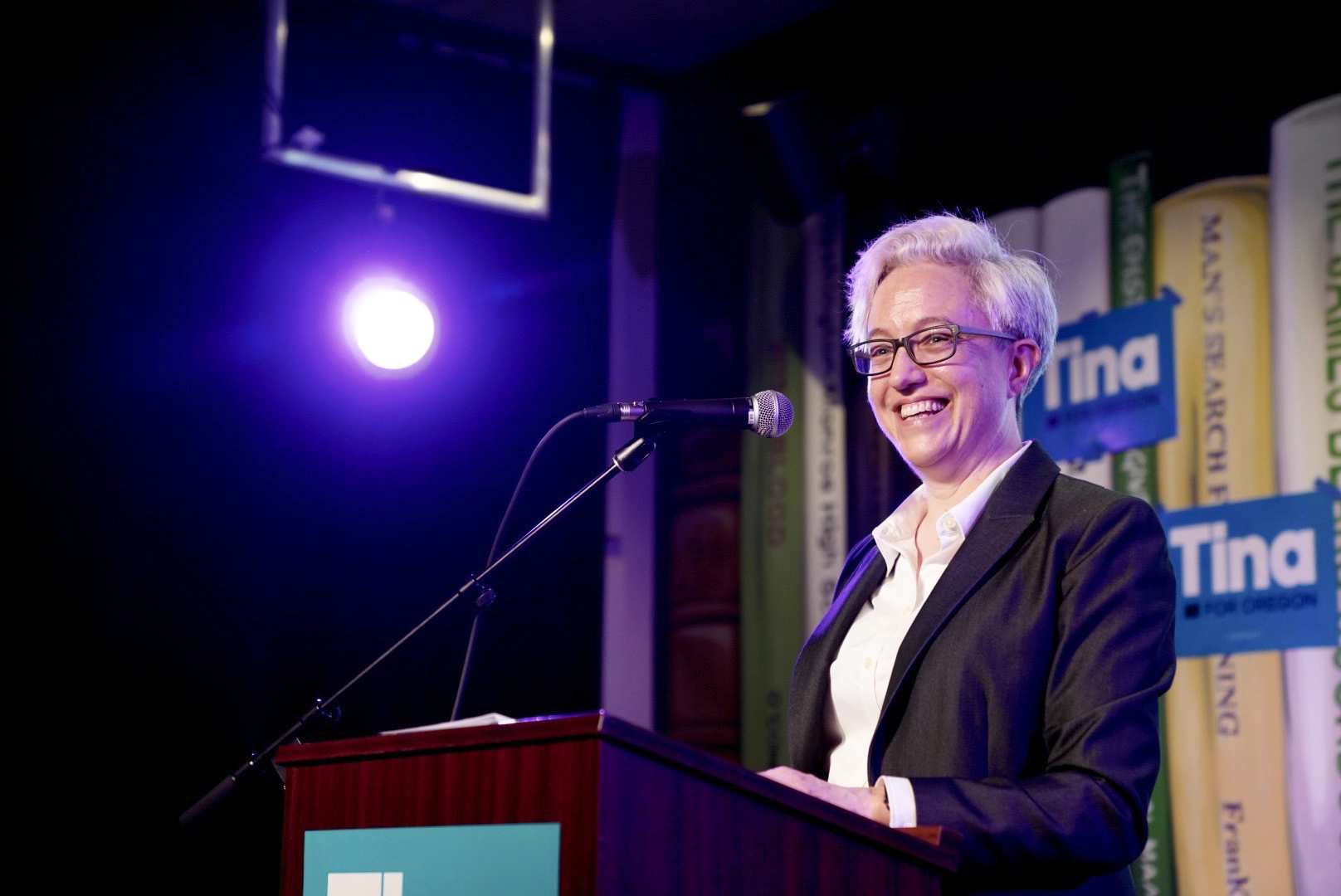
Candidate for the Democratic nomination for Governor Tina Kotek speaks to her supporters at an election night party at Revolution Hall on May 17, 2022 in Portland, Ore.
Jonathan Levinson / OPB
Voters aren’t thrilled with the state of affairs in Oregon, but that wasn’t enough for Democrats to reject a longtime party leader on Tuesday. Former Speaker of the House Tina Kotek defeated State Treasurer Tobias Read to become the Democratic nominee for governor in November.
Initial results released shortly after 8 p.m. Tuesday had Kotek with 57% of the vote and Read with 31%. Read conceded the race in a voicemail to Kotek not long after, she said. Read was not granting interviews Tuesday night, his campaign said.
Related: Oregon voters are angry and worried. This OPB series looks at what the next governor can do to help
At a gathering in a Southeast Portland concert venue, Kotek led cheering supporters in a champagne toast after the race was decided.
“Those are some pretty nice numbers,” she said nodding to a display of the election results and thanking her gathered supporters — an assemblage of political insiders, labor union representatives, advocacy group staff and fans.
But much of Kotek’s acceptance speech was trained, not on Tuesday night’s primary victory, but on November’s general election. She likely faces a competitive three-way race that will include a nonaffiliated candidate, former longtime state Sen. Betsy Johnson, and the winner of the Republican primary, which hadn’t been clearly decided late Tuesday. Former House Republican Leader Christine Drazan was leading that GOP race.

Supporters for Tina Kotek at her election night party at Revolution Hall on May 17, 2022 in Portland, Ore.
Jonathan Levinson / OPB
“This will be a three-way race for the highest office in our state, and this will be an election unlike anything any of us have ever seen,” Kotek told supporters.
Kotek said Tuesday that she expected results to be closer than early returns suggested, so much so that her campaign issued a memo Tuesday seeking to manage supporters’ expectations. The easy win indicates Kotek’s long history of championing progressive policies — and the many institutional allies she made in the process — may be enough to sway liberal primary voters amid some serious headwinds.
Polling has repeatedly shown many Oregon voters are alarmed by rising homelessness, gun violence and other societal woes, and Read attempted to run a centrist campaign that blamed Kotek for presiding over a state in decline.
A memo Kotek's campaign is circulating today is not projecting a ton of confidence -- at least that results will be known tonight. Many, many Dems have treated Kotek's win as an inevitability. #orpol pic.twitter.com/ZGKPkugJKL
— Dirk VanderHart (@dirquez) May 17, 2022
Kotek appears to have successfully sold voters on her deep knowledge of Salem’s inner workings, along with her track record of passing bills that, among other things, raised the minimum wage, enacted new gun controls, regulated carbon emissions and protected abortion. If she prevails in November, Kotek will become the first openly lesbian governor elected in the nation.
This year’s Democratic primary marked the first time in two decades that a gubernatorial race didn’t include an incumbent politician or a former governor. Gov. Kate Brown is prevented from running for re-election by term limits.
The lure of an open seat attracted huge interest from candidates in both parties. In all, 16 Democrats filed to run for the seat, including former New York Times columnist Nick Kristof, who resigned his high-profile job to mount a campaign.
But Kristof saw early fundraising momentum come to nothing in February, when the Oregon Supreme Court agreed with a ruling by elections officials that he did not meet the state’s three-year residency requirement. No other Democratic candidate – including 2018 Independent Party nominee Patrick Starnes – could mount a campaign with enough momentum to challenge Kotek or Read.

Candidate for the Democratic nomination for Governor Tina Kotek and her wife Aimee Kotek Wilson speak to supporters at an election night party at Revolution Hall on May 17, 2022 in Portland, Ore.
Jonathan Levinson / OPB
Kotek in many ways seemed to run as a de facto incumbent in the race. She dominated the competition for institutional endorsements, racking up support and funding from the progressive labor and advocacy groups that typically propel Democrats into office.
At the same time, Kotek sought to parry accusations – from Read and others – that she is little more than “Kate Brown 2.0,″ as culpable as the governor for the state’s ongoing travails. Recent polling suggests that Brown is the least popular governor in the country.
Read, meanwhile, ran as an “outsider” candidate, a self-selected label that belied his 15 years as a state lawmaker and treasurer. His more centrist pitch to voters cast Read as a Democrat untethered from powerful interest groups and willing to take a tougher approach to growing homelessness and lackluster school outcomes.

Tobias Read
Kristyna Wentz-Graff / OPB
While Read largely lagged Kotek in endorsements, he did have some high-profile support: Former governors Barbara Roberts and John Kitzhaber backed his candidacy.
With the primary over, Democrats are gearing up for a tough test in November. Alongside the Republican candidate, the party expects to face Betsy Johnson, a former longtime Democratic senator who left the party last year to mount a nonaffiliated campaign for governor.
A business-friendly politician who sided with Republicans on issues like guns and carbon emissions, Johnson has proven to be a fundraising juggernaut. She’s reported raising more than $8 million so far, including $1.75 million from Nike co-founder Phil Knight.
That money could make Johnson the rare unaffiliated candidate to have a real shot at winning the governor’s office if, as expected, she gathers enough signatures to make the November ballot.
Republicans, though, believe Johnson could prove a “spoiler” candidate who siphons Democratic votes and helps the GOP win the governor’s office for the first time in 40 years.


